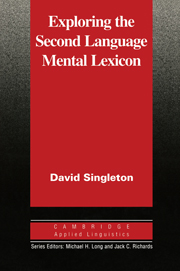A recapitulation, some inferences and some hopes for the future
Published online by Cambridge University Press: 05 October 2012
Summary
The ground covered in this book
This book began with some cautionary comments about its own content. In Chapter 1 it was acknowledged that, although words and the concept of the word are of prime importance in our understanding of the nature of language, the word escapes easy definition. It was further noted that, while the current conception of the lexicon no longer fits the traditional image of a mere inventory of content words, precisely this broadening and complexifying of the way in which the lexicon is understood has led to a blurring of the traditional distinction between lexicon and other domains of language – to the point where the viability of a separate lexical construct has begun seriously to be questioned. The chapter concluded with the suggestion that until the precise status of the lexicon becomes clearer, it is appropriate to opt for a provisional modus operandi which ‘plays safe’ in relation to the lexical construct by treating as lexical those areas which are most self-evidently language-particular – forms and meanings of individual items, collocational patterns, ‘local’ colligation (e.g., complementation of verbs), etc.
In Chapter 2 we explored some aspects of the challenge posed by lexical acquisition – isolating lexical units in the speech stream, connecting lexical forms to appropriate meanings, and acquiring lexis from written input – deriving from this exploration the conclusion that it is possible to identify a number of respects in which the L2 lexical-acquisition challenge closely resembles the L1 lexicalacquisition challenge.
Information
- Type
- Chapter
- Information
- Exploring the Second Language Mental Lexicon , pp. 269 - 279Publisher: Cambridge University PressPrint publication year: 1999
